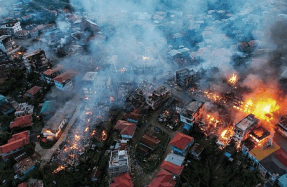RIP TIDES


UNLIKE IN THAT ONE FAIRYTALE where a lost shoe portends a happily-ever-after, in The Tide Will Turn, the photographer Shahidul Alam’s post-pris on almanac of Bangladesh’s political and cultural scene, missing shoes convey a very different sensibility: they are (missing) props for the macabre. On the day of Alam’s presentation at court in 2018, a day after his state-led abduction from home, he was seen in the same kurta he was wearing the night before.
In custody of the notorious Detective Branch, which tortured and threatened him, Alam records how his wardens washed and ironed the bloodstained tunic for the court appearance. Politesse must have been the least of the abductors’ priorities, as we all witnessed how the arm of the law gagged and dragged him from a van to the court. He was also barefoot. Later in the book, there is an image of a lone pair of tattered flats from an exhibition about the abduction and disappearance of the indigenous student activist Kalpana Chakma, in 1996. One of her last words, as she was forced away from home late at night by military personnel, were, “Brother, save me.” The shoes were one of the last remnants of her life.
As this book attests, and as Alam himself recognises, he was somewhat more fortunate—at least he is here to tell the tale—although, he also confirms, in an adjusted reality. Gone are the days of carefree bicycle rides and unguarded conversations with street vendors. He now has newer rituals: periodic calls home, not going anywhere alone, glancing over his shoulder. The book itself is a glance back at a career that coincided with the twists and turns of Bangladeshi politics.
Shahidul Alam was imprisoned for over a hundred days without trial, for reporting on digital platforms and giving interviews to foreign media at the height of student protests on road safety in Dhaka. Within hours of him giving an interview on that was critical of the regime and its response to the protests, security forces were at his door, without a warrant, to haul him away to a waiting vehicle, while his partner and a colleague-comrade-neighbour were having a meal in an apartment just above. title borrowed from Arundhati Roy’s letter to him in jail, which is included in the book—grips around these mises en scène, and not just the circumstances of his imprisonment.
You’re reading a preview, subscribe to read more.
Start your free 30 days





